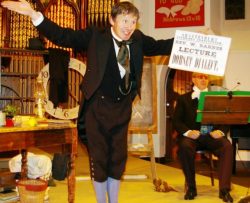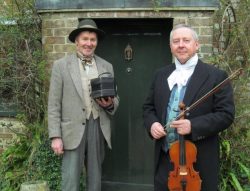 MOST people who know the name of William Barnes will think of him as the poet of the old Dorset dialect, the writer of Linden Lea, and a near-contemporary of a more famous Dorset literary star, Thomas Hardy. But who was at the real Barnes? Historian, musician and actor Tim Laycock is performing his play, The Year Clock, with his regular collaborator, folk fiddler Colin Thompson, for two performances at Dorchester on Thursday 24th October and Sturminster Newton on Sunday 3rd November. Tim has revived his 2001 play to raise funds for the cataloguing and digitising of the William Barnes Archive
MOST people who know the name of William Barnes will think of him as the poet of the old Dorset dialect, the writer of Linden Lea, and a near-contemporary of a more famous Dorset literary star, Thomas Hardy. But who was at the real Barnes? Historian, musician and actor Tim Laycock is performing his play, The Year Clock, with his regular collaborator, folk fiddler Colin Thompson, for two performances at Dorchester on Thursday 24th October and Sturminster Newton on Sunday 3rd November. Tim has revived his 2001 play to raise funds for the cataloguing and digitising of the William Barnes Archive
The Year Clock: A Celebration of Language, History, and the Life of William Barnes will be staged in the Victorian Hall at the Dorset Mseum and Art Gallery in Dorchester at 7pm with a matinee at Sturminster’s Exchange at 3pm.
The play is a poignant and vivid celebration of the remarkable life of William Barnes, who is not only one of Dorset’s most beloved literary figures, but also a true polymath. Barnes (1801–1886) was a self-educated teacher, parson and poet, renowned for his works in the Dorset dialect, including Linden Lea, later set to music by Ralph Vaughan Williams. But perhaps his greatest claim to fame was his passion for philology – he studied more than 60 languages in his quest to uncover the roots of human speech. He considered this work to be his greatest legacy – his Philological Grammar remains a vital contribution to the field.
 Tim Laycock’s play brings Barnes’ life to the stage, drawing on his notes letters and contemporary accounts sourced from the William Barnes Archive, which is currently held in the Dorset History Centre. The play is structured around the four seasons, symbolising key stages in Barnes’ life, and features poems and songs composed between 1835 and 1870. The final piece, The Geate a-Vallen To, was dictated by Barnes to his daughter shortly before he died in 1886.
Tim Laycock’s play brings Barnes’ life to the stage, drawing on his notes letters and contemporary accounts sourced from the William Barnes Archive, which is currently held in the Dorset History Centre. The play is structured around the four seasons, symbolising key stages in Barnes’ life, and features poems and songs composed between 1835 and 1870. The final piece, The Geate a-Vallen To, was dictated by Barnes to his daughter shortly before he died in 1886.
Accompanied by traditional Dorset folk music performed by Colin Thompson on violin and guitar, the production delves into Barnes’ inner conflict as a highly educated man who chose to write in the rural Dorset dialect, offering a moving exploration of the tension between Victorian England’s industrialisation and the fading rural way of life.
Described by Thomas Hardy as “the most interesting link between the past and present forms of rural life that England possessed,” and by Francis Kilvert as “half hermit, half enchanter,” Barnes left a legacy that remains deeply rooted in England’s rural traditions and social transformations.
This revival is hosted in collaboration with the William Barnes Society, and is supporting the Barnes for All! campaign, raising funds to preserve Barnes’ rich archive at the Dorset History Centre.
Pictured: Tim Laycock and Colin Thompson (seated) in a performance of The Year Clock in 2001, © Tim Laycock; ands the duo in costume for the revival, © Tony Gill